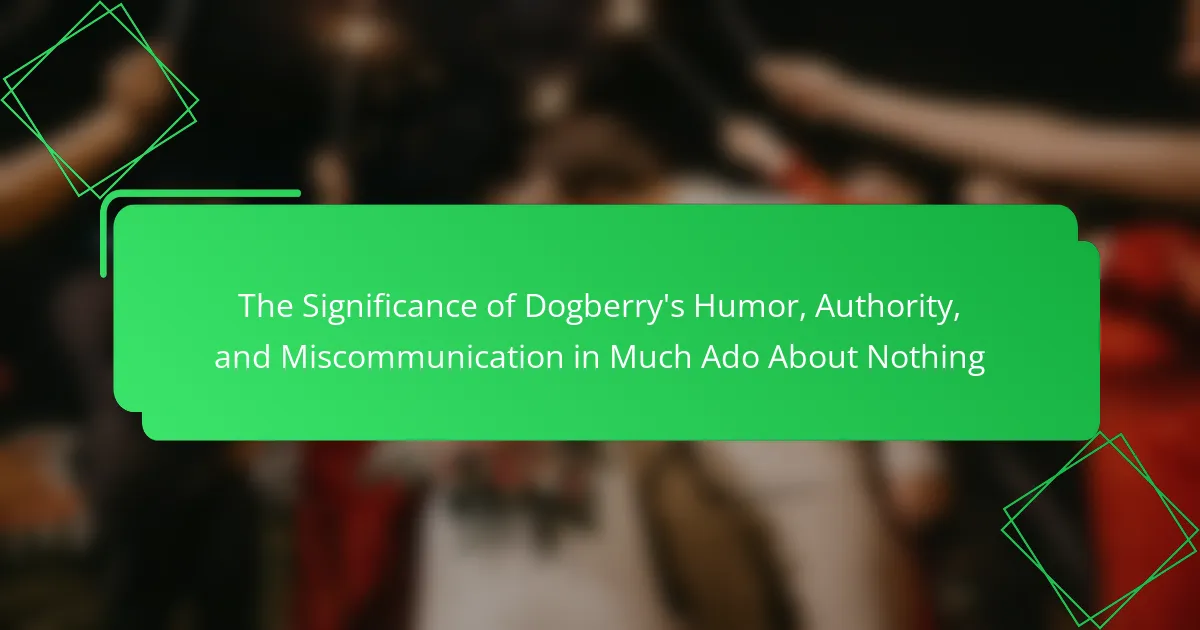
What is the significance of Dogberry’s humor in Much Ado About Nothing?
Dogberry’s humor in Much Ado About Nothing serves to highlight the theme of miscommunication. His malapropisms and misunderstandings create comedic relief. This humor also underscores the incompetence of authority figures. Dogberry’s character contrasts with the play’s more serious moments. His humorous interactions reveal societal flaws. They show how misinterpretations can lead to significant consequences. Ultimately, Dogberry’s humor emphasizes the complexity of communication in relationships. It reinforces the play’s exploration of truth and deception.
How does Dogberry’s humor contribute to the play’s comedic elements?
Dogberry’s humor significantly enhances the play’s comedic elements through his malapropisms and misunderstandings. His misuse of language creates absurd situations that amuse the audience. For example, Dogberry’s confusion of words leads to comical misinterpretations of serious matters. This humor highlights the theme of miscommunication prevalent in the play. Additionally, his self-importance contrasts with his incompetence, adding to the comedic effect. The interactions between Dogberry and other characters often result in humorous exchanges. These moments provide levity amidst the play’s more serious themes. Overall, Dogberry’s character serves as a vehicle for humor, enriching the comedic landscape of “Much Ado About Nothing.”
What specific instances of humor are presented through Dogberry?
Dogberry presents humor through his malapropisms and misunderstandings. His misuse of words creates comedic situations. For example, he refers to “the most senseless villain” instead of “the most villainous senseless.” This highlights his lack of intelligence. Another instance occurs when he claims, “to be a well-favored man is the gift of fortune.” This statement is absurd in context. Dogberry’s self-importance adds to the humor. He believes he is an authority despite his incompetence. His interactions with the watchmen further illustrate this. They often mock him, showcasing his ineffectiveness. These instances contribute to the comedic tone of the play.
How does Dogberry’s humor affect other characters’ perceptions?
Dogberry’s humor often leads other characters to perceive him as foolish and incompetent. His malapropisms and absurdity create a comedic effect that undermines his authority. For instance, characters like Leonato and the watchmen frequently mock his language and decisions. This ridicule causes them to dismiss his opinions and judgments. Consequently, Dogberry’s attempts at seriousness are often met with laughter rather than respect. This dynamic illustrates how humor can distort perceptions of competence and credibility in a social hierarchy. Ultimately, Dogberry’s humor serves to highlight the theme of miscommunication in the play.
Why is Dogberry’s humor essential for the audience’s engagement?
Dogberry’s humor is essential for audience engagement because it provides comic relief amidst serious themes. His malapropisms and misunderstandings create a light-hearted atmosphere. This humor allows the audience to connect with the characters on a more relatable level. It also highlights the absurdities of authority figures. The audience enjoys the contrast between Dogberry’s self-importance and his ineptitude. This juxtaposition fosters laughter and keeps the audience invested in the narrative. Moreover, Dogberry’s interactions often advance the plot through humor. His comedic role engages the audience, making them more receptive to the play’s deeper messages.
How does humor enhance the themes of misunderstanding and miscommunication?
Humor enhances the themes of misunderstanding and miscommunication by highlighting the absurdity of situations. In “Much Ado About Nothing,” Dogberry’s comedic blunders create confusion. His malapropisms and misinterpretations lead to significant plot developments. These humorous elements underscore the characters’ inability to communicate effectively. The laughter generated allows the audience to engage with serious themes. It also emphasizes the gap between intention and perception. Humor serves as a vehicle for revealing deeper truths about relationships. Ultimately, it transforms misunderstandings into moments of levity, making the themes more relatable.
What role does Dogberry’s character play in the overall comedic tone of the play?
Dogberry’s character serves as a crucial source of humor in Much Ado About Nothing. His malapropisms and misunderstandings create comedic situations that entertain the audience. Dogberry’s misguided sense of authority adds to the absurdity of his character. He often misinterprets situations, leading to humorous outcomes. His interactions with other characters highlight the theme of miscommunication. This miscommunication emphasizes the play’s comedic tone. Dogberry’s role exemplifies the folly of self-importance. His character ultimately reinforces the lightheartedness of the play.

How does Dogberry’s authority influence the events in Much Ado About Nothing?
Dogberry’s authority significantly influences the events in Much Ado About Nothing by affecting the outcomes of key plot points. His role as the constable provides him with a position of power, albeit comically undermined by his ineptitude. Dogberry’s miscommunication leads to misunderstandings that propel the narrative forward. For instance, his failure to articulate the arrest of Borachio ultimately delays the revelation of Don John’s plot. This delay allows misunderstandings between characters to persist, particularly regarding Hero’s fidelity. Furthermore, Dogberry’s humorous character provides comic relief while simultaneously highlighting the folly of authority figures. His authority, though flawed, becomes crucial in the resolution of conflicts, as his actions inadvertently lead to the truth being uncovered. Overall, Dogberry’s influence showcases the interplay between authority and miscommunication in the play.
What are the implications of Dogberry’s position as a constable?
Dogberry’s position as a constable implies a blend of authority and comedic ineptitude. As a constable, he is responsible for maintaining law and order in Messina. His humorous miscommunications often undermine his authority. This creates a contrast between his official role and his actual effectiveness. Dogberry’s lack of self-awareness leads to absurd situations. These situations highlight the theme of misunderstanding in the play. His character serves to critique the reliability of those in power. Ultimately, Dogberry’s role emphasizes the folly of misguided authority in society.
How does Dogberry’s authority shape the narrative’s progression?
Dogberry’s authority significantly shapes the narrative’s progression by introducing comedic elements and misunderstandings. His role as the constable provides a contrast to the more serious characters. This contrast highlights the absurdity of the situations that unfold. Dogberry’s miscommunication often leads to pivotal plot developments. For instance, his failure to convey important information delays the resolution of conflicts. This delay creates tension and humor simultaneously. Additionally, his misguided confidence influences other characters’ actions. Ultimately, Dogberry’s authority serves as a vehicle for both comedy and narrative advancement.
In what ways does Dogberry’s authority lead to misunderstandings?
Dogberry’s authority leads to misunderstandings through his misuse of language and his overconfidence. His malapropisms create confusion among characters. For instance, he often uses incorrect words, which alters the intended meaning. This results in misinterpretations of serious situations. Dogberry’s self-importance prevents him from recognizing his own errors. His insistence on authority makes others doubt their own perceptions. Additionally, his interactions with other characters often lack clarity. This further compounds the miscommunication within the narrative. Ultimately, Dogberry’s flawed authority undermines effective communication in the play.
How does Dogberry’s authority contrast with other characters’ roles?
Dogberry’s authority contrasts sharply with other characters’ roles in “Much Ado About Nothing.” He is a comically inept constable, lacking the intelligence and competence typically associated with authority figures. Unlike noble characters such as Leonato or Don Pedro, who wield power effectively, Dogberry’s bumbling nature undermines his authority. His humorous miscommunication often leads to confusion rather than resolution. In contrast, characters like Benedick and Beatrice display wit and clarity, enhancing their social dynamics. Dogberry’s role highlights the absurdity of social hierarchies, showcasing that authority does not always equate to respect or effectiveness. His interactions serve as a critique of societal norms regarding leadership and competence.
What are the power dynamics between Dogberry and the nobility?
Dogberry holds a lower social status compared to the nobility in “Much Ado About Nothing.” His role as the constable places him in a position of authority over local matters. However, he often miscommunicates and misunderstands situations, leading to humorous outcomes. The nobility, represented by characters like Leonato and Claudio, often dismiss Dogberry’s authority. They view him as a figure of ridicule rather than respect. Despite this, Dogberry’s actions ultimately contribute to the resolution of the play’s conflicts. His humorous missteps reveal the flaws in the nobility’s understanding and judgment. This dynamic highlights the theme of social hierarchy and the value of all voices, regardless of status.
How does Dogberry’s authority affect the resolution of the play’s conflicts?
Dogberry’s authority significantly impacts the resolution of the play’s conflicts by providing comedic relief and facilitating crucial revelations. His role as the constable leads to the discovery of the truth behind the misunderstandings. Dogberry’s bumbling nature contrasts with the seriousness of the situations, allowing characters to confront their issues more openly. For example, his misinterpretation of language ultimately aids in exposing the villainous actions of Don John. This revelation is pivotal for resolving the tension between Claudio and Hero. Additionally, Dogberry’s insistence on proper procedure highlights the absurdity of the conflicts. His authority, though comically portrayed, becomes instrumental in restoring order and harmony at the play’s conclusion.

What role does miscommunication play in Dogberry’s interactions?
Miscommunication plays a central role in Dogberry’s interactions. His misuse of language creates comedic misunderstandings. Dogberry often misinterprets situations due to his lack of clarity. This leads to confusion among other characters. For example, he mistakenly refers to “the most exquisite” when he means “the most excellent.” Such errors highlight his ineptitude as a constable. The humor derived from these miscommunications adds to the play’s comedic elements. Ultimately, Dogberry’s interactions demonstrate how miscommunication can lead to both humor and chaos in social situations.
How does miscommunication contribute to the plot’s development?
Miscommunication drives the plot development in Much Ado About Nothing by creating conflict and tension. Dogberry’s humorous misinterpretations lead to critical misunderstandings among characters. These misunderstandings result in wrongful accusations and emotional turmoil. For example, the failure to communicate effectively about Hero’s fidelity triggers a series of dramatic events. The chaos caused by miscommunication ultimately propels the narrative forward. It highlights themes of deception and the complexity of truth. The resolution of these miscommunications leads to character growth and reconciliation. Thus, miscommunication is essential for advancing the plot and exploring deeper themes.
What examples of miscommunication are highlighted in Dogberry’s dialogues?
Dogberry’s dialogues highlight several examples of miscommunication. One example is his misuse of words, such as saying “comprehend” instead of “apprehend.” This leads to confusion among the characters. Another instance occurs when Dogberry insists on the importance of “the watch,” but his authority is undermined by his poor communication skills. He often misunderstands or misinterprets situations, such as when he fails to realize the gravity of the accusations against Borachio. His frequent malapropisms create humorous misunderstandings, which distract from serious matters. These examples illustrate how Dogberry’s miscommunication serves both comedic and thematic purposes in the play.
How does miscommunication affect the relationships between characters?
Miscommunication can create misunderstandings and conflict between characters. In “Much Ado About Nothing,” Dogberry’s humorous misinterpretations lead to critical errors in judgment. This causes tension between characters like Claudio and Benedick. Miscommunication also results in the wrongful accusation of Hero, straining her relationship with Claudio. The humor in Dogberry’s character often masks serious consequences of these misunderstandings. Ultimately, miscommunication complicates the narrative and highlights the fragility of relationships. Such dynamics reveal how easily trust can be undermined through unclear communication.
Why is miscommunication significant in the context of the play’s themes?
Miscommunication is significant in the context of the play’s themes because it drives the plot and reveals character dynamics. In “Much Ado About Nothing,” Dogberry’s humorous misunderstandings highlight the folly of authority figures. These miscommunications create tension and conflict among characters, particularly in romantic relationships. The play illustrates how misinterpretations can lead to false accusations and emotional turmoil. For instance, Claudio’s rejection of Hero is based on a miscommunication regarding her fidelity. This theme underscores the fragility of trust and the impact of words. Ultimately, miscommunication serves as a catalyst for both comedic and tragic moments, shaping the narrative’s progression.
How does miscommunication relate to the broader themes of love and deception?
Miscommunication often acts as a catalyst for both love and deception. In relationships, unclear communication can lead to misunderstandings, which may foster feelings of mistrust. This mistrust can create a fertile ground for deception, as individuals may hide their true intentions or feelings. For example, in Shakespeare’s “Much Ado About Nothing,” miscommunication drives the plot and complicates romantic relationships. Characters misinterpret messages, leading to conflicts that challenge their love. The humor of Dogberry’s miscommunication highlights the absurdity of these misunderstandings, emphasizing how easily love can be jeopardized. Ultimately, miscommunication intertwines with love and deception, illustrating the fragility of human connections.
What lessons can be drawn from Dogberry’s miscommunications?
Dogberry’s miscommunications illustrate the importance of clear communication. Misunderstandings can lead to significant consequences, as seen in the plot of Much Ado About Nothing. Dogberry’s misuse of language often results in confusion among characters. This highlights how authority figures can undermine their credibility through poor communication. Additionally, his humorous blunders serve as a reminder that humor can obscure serious issues. The audience learns that effective communication is crucial in both personal and professional contexts. Ultimately, Dogberry’s errors demonstrate the potential pitfalls of miscommunication in any setting.
What practical insights can we gain from Dogberry’s humor, authority, and miscommunication?
Dogberry’s humor, authority, and miscommunication provide insights into the nature of social hierarchy and language. His comical misuse of language highlights the absurdity of rigid social structures. This reflects how authority can be undermined by incompetence. Furthermore, Dogberry’s miscommunication illustrates the potential for misunderstanding in communication. It emphasizes the importance of clarity and precision in language. The outcomes of his interactions reveal that humor can serve as a tool for social critique. This suggests that laughter can expose flaws in authority. Overall, Dogberry’s character serves as a reminder of the complexities of communication in societal roles.
The main entity of the article is Dogberry, a character in Shakespeare’s “Much Ado About Nothing.” The article examines the significance of Dogberry’s humor, authority, and miscommunication, highlighting how his malapropisms and misunderstandings contribute to the play’s comedic elements while underscoring themes of miscommunication and the incompetence of authority figures. It discusses specific instances of humor, the impact of Dogberry’s character on other characters’ perceptions, and the role of miscommunication in advancing the plot. Additionally, the article explores the implications of Dogberry’s authority within the narrative and its effects on relationships, ultimately emphasizing the importance of clear communication in both personal and societal contexts.


